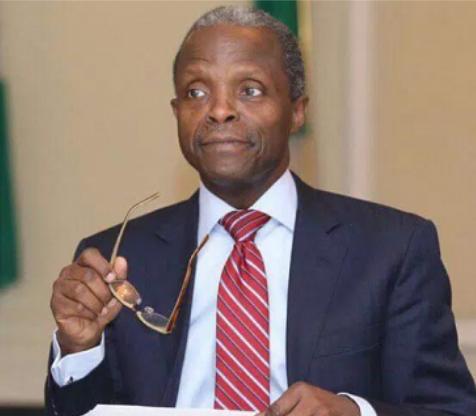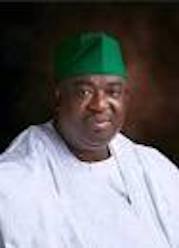NEWS
Energy Poverty Has to be Tackled Headlong — Osinbajo

Vice President Yemi Osinbajo says energy poverty has to be tackled headlong for African countries to attain middle-income status and an inclusive prosperity for its people.
Osinbajo’s spokesman, Laolu Akande, in a statement on Tuesday in Abuja, said the vice president delivered a Special Public Lecture at the University of Pennsylvania (UPENN) in Philadelphia, U.
S.The vice president spoke on the title “Energy Transition in Africa.
”Osinbajo outlined specific pathways that would lead to climate-positive economic growth on the continent and at the same time lead to the realisation of the global net-zero emissions targets.
“Africa’s endowments, renewable energy, natural resources and a young workforce, present a compelling set of circumstances for several pathways to climate-positive growth.
“Low emissions consumption and production, the point being that Africa can, instead of going the carbon-intensive path to providing energy, goods and services for its own needs, take full advantage of green technologies and practices.
“There is the distinct advantage that Africa can actually pursue a green course of growth without worrying about costly legacy infrastructure.”
The vice president said that second pathway had to do with the recognition that global zero carbon ambitions could be realised without intentional carbon removal technologies and practices.
He said that Africa could ramp up her own potential to do it at scale through a combination of planned land use and ecosystem management, and investment in emerging engineered removal technologies.
“The third pathway is that, with its abundant reserves of renewable energy and raw materials, Africa can become a hugely competitive green manufacturing and energy hub for the world that could also accelerate the greening of global industry.
“Thus, the paradox of an energy-poor continent becoming the green industrial powerhouse of the world is easily resolvable and must be.”
The vice president proposed that the developed world change its perception of Africa.
He charged that the continent should not be seen merely as a victim but as a solution in the climate change conversations and the attainment of the global net zero targets by 2050-2060.
On energy poverty, Osinbajo argued that it could only be resolved if there was a significant investment in renewable energy.
“And that can only happen if we create the energy intense anchor demand that makes the investment in additional renewable energy bankable.
“Therefore, it is not which comes first – renewable energy generation capacity or industrial deployment, both must be developed concurrently.”
Osinbajo also spoke on Africa’s dependence on its oil and gas resources.
He said that the use of gas as a transition fuel would not significantly derail the commitment to carbon-negative growth.
“Nigeria’s Energy Transition Plan attempts to chart an energy transition pathway which has as its bedrock, the development of renewable energy, specifically solar.
“The plan is to develop 250 gigawatts of solar capacity by 2060.
“The plan outlines our decarbonisation strategies in the areas of power, oil and gas transportation; it also militates against medium to long-term job losses in an industry that has dominated the economy for decades.
“It recommends the role of gas as a transition fuel, to balance large influxes of solar power on the grid, its use as a cheaper, and relatively clean option for base load power for industry, as we watch the cost of solar batteries plunge.
“There are also practical ways in which gas, especially propane, will bridge the gap before the full use of renewables is commercially practical.
“To illustrate the point practically, recently some discussions have been taking place about the decommissioning of industrial scale diesel and petrol generators used at base stations of telecommunication companies in Nigeria,” he said.
Previous speakers who had featured at the UPENN Special Lecture series hosted by the U.S. Ivy League University’s Centre for Africana Studies, include Nobel Laureate, Prof. Wole Soyinka and the President of Botswana, Mr Mokgweetsi Masisi.
Earlier in her welcome remarks, Prof. Beth Winkelstein, Interim Provost, UPENN, said that the planet was facing an existential struggle against climate change for the earth.
“And indeed for us to last, we must join with our fellow nations around the world in this struggle.
“Like many countries, including the United States, Nigeria is challenged by competing and sometimes conflicting interests and its development prospects are complex.
“Nigeria holds amongst the continent’s largest proven oil reserves and faces a potentially perilous future of climate-induced sea level rise and drought.
“In short, global progress in the battle against climate change needs Nigeria’s partnership and participation,” she said.
On his part, Prof. Tukufu Zuberi of the Africana Centre, spoke about the relationship between the university and Nigeria.
He thanked the vice president for honouring the institution’s invitation, noting that the lecture series was part of its efforts in correcting the negative perceptions about Africa.
“Africa in many ways, has not been treated fairly in conversations, often this treatment is simply a result of not understanding Africa,” he said.
After the lecture, Wale Adebanwi, Professor of Africana Studies at the University of Pennsylvania, led an interactive session with the vice president.
Earlier on arrival, Osinbajo had met with the leadership of the university and was later conducted around the Penn Museum by Prof. Tukufu Zuberi.(NAN)
NEWS
Eight Students Die, Three Injure in Jos Road Crash

From Jude Dangwam, Jos
The Vice Chancellor of the University of Jos, Prof. Ishaya Tanko has confirmed the sad death of 8 students of the University to a road crash involving their Toyota bus with a truck in the metropolitan city of Jos.
He disclosed that one of the students was being prepared for surgery in the early hours of Thursday at the Jos University Teaching Hospital while others were receiving medication at the Bingham Teaching Hospital.
The Federal Road Safety Corps (FRSC) Plateau State Command disclosed that the accident occurred opposite Unity Bank Zaria Road, Jos, at around 2:30 am.
The Plateau State Sector Commander of the Corps, Olajide Mogaji explained that seven people lost their lives on the spot, while another victim died in hospital, bringing the total number of fatalities to eight.
According to the Command’s statement, the crash involved a trailer and a bus, which was carrying eleven passengers, all male students of the University of Jos, opposite Unity Bank Zaria Road, Jos, at around 2:30 am.
Mogaji said eyewitness accounts revealed to the corps emergency teams that the bus was speeding and engaged in wrongful overtaking, leading to the loss of control and the crash.
The Sector Commander has appealed to drivers to avoid night trips, excessive speed, and dangerous driving, saying, “The government needs you alive, and wants you to live life to the fullest in this festive season and beyond.”
The FRSC noted that the incident is still under investigation, while urging the public to report crashes or road emergencies to their toll-free emergency number 122 at all times for prompt responses.
The victims were said to have been coming back from a welcome special party for new students when the unfortunate incident occurred with the vehicle carrying the male students while the other vehicle carrying the female students escaped the tragedy.

UNICEF Hails Bayelsa as Champion of Primary Healthcare Devt in Nigeria
From Mike Tayese, Yenagoa
The United Nations Children’s Fund (UNICEF) has commended the Bayelsa State Government for its deliberate efforts at improving primary healthcare delivery, especially in the area of immunization in recent years.
The Country Representative of UNICEF in Nigeria, Wafaa Saeed, gave the commendation, on Wednesday, when she led a delegation on a courtesy visit to Government House, Yenagoa.
Saeed said what she saw during her visit to some health facilities and her random interactions with some mothers in the state, corroborated the positive reports UNICEF has been receiving about Bayelsa in terms of immunization.
The special UN envoy, who described Bayelsa as champion of healthcare delivery and a shining spot in the country, noted that the state has achieved an impressive performance in its immunization indices from 2021 to date.
She attributed the improvement in the health indicators of the state to purposeful leadership, commitment and accountability being provided by the present administration.
While assuring the Bayelsa of UNICEF’s readiness for collaboration to improve nutrition for children as well as unlock resources for healthcare development in the state, the Country Rep, however, urged the Governor Douye Diri-led administration to sustain its efforts in the health sector.
She said, “We are really impressed with what Bayelsa is doing… Bayelsa State has also committed its financing of immunization campaigns from the state budget, and a special one (immunization) in-between.
“Also there is a monthly allowance and support you have continued to give from GAVI. These are some of the things that have really increased the number of immunized children and improved the performance of the state.
“In 2021, the number of children not immunized in Bayelsa was 71 percent; that means seven out of ten kids were not immunized. But between then and now, there is a big difference due to the leadership, commitment and accountability we are seeing in Bayelsa State.
“You have been a champion of primary healthcare and a champion of immunization. And I really look to have Bayelsa not only a champion of states in Nigeria but in our continent and the globe.”
In a response, Governor Douye Diri represented by his deputy, Senator Lawrence Ewhrudjakpo, reaffirmed the determination of his administration to prioritize investments in the health sector.
He said plans were underway to review the state primary healthcare board law with a view to not only sustaining the extant primary healthcare funding model but also expanding it through effective private sector contributions, especially from corporate organizations operating in the state.
Diri thanked the Country Rep, Ms Wafaa Saeed, for her kind words of encouragement and also acknowledged the support of UNICEF, WHO, Bill Gate, Dangote Foundation and other development partners, noting that Bayelsa could not have recorded its present achievements in the health sector without their collaboration.
His words: “We also want to thank you profusely for supporting our programme. We thank UNICEF, the WHO, Bill Gate Foundation, Dangote Foundation and others for your support. We really appreciate what you have done for our state.
“As a government, we know where we are going. A man who knows where he is going cannot be misled. We are focused and will continue to redouble our efforts in the health sector.
“You talked about sustainability. That is very important to us, and so, we are looking at the principal law, which is the Primary Healthcare Development Board Law. We are looking at some areas of that law to bind the hands of whoever that comes after us.
“That is to ensure that even if the administration after us will not have the motivation and passion to provide leadership for primary healthcare like the present governor is doing, the law will compel them to do so.”
The UNICEF Country Representative was accompanied on the visit by the Chief of Field Service, Judith Leville, UNICEF Health Consultant, Dr. Makio Perekeme, the Chief Field Officer, Anselm Audu and a health specialist, Eghe Abe, among others.

Mutfwang Pledges Support for Minister of Defence in Fight against Insecurity
From Jude Dangwam, Jos
Plateau State Governor, Caleb Mutfwang, has paid a courtesy visit to the newly appointed Minister of Defence, Gen. Christopher Gwabin Musa (Rtd), assuring him of his total and unwavering support in the collective effort to defeat insecurity in Plateau State and across Nigeria.
The Director of Press and Public Affairs to the Governor, Gyang Bere on Thursday disclosed that the Governor has expressed delight over Gen.
Musa’s appointment, describing it as a “strategic and timely decision” in confronting the country’s intricate and evolving security challenges.Mutfwang noted that the Minister’s vast experience and proven professionalism would significantly strengthen ongoing national security interventions.
“We must now focus on finding solutions to the challenges confronting us. Whatever has happened in the past should not deter us. The time has come for all of us to join hands and holistically address our security concerns,” Mutfwang emphasized.
The Governor reiterated his support for the establishment of State Police, acknowledging concerns about possible abuses, but stressing that the nation must collectively develop safeguards and ensure operational efficiency.
Gen. Christopher Musa expressed gratitude for the Governor’s visit, assuring him of a robust and productive collaboration in addressing security concerns in Plateau State and the country at large.
He commended Governor Mutfwang for hosting the Plateau Unity Christmas Carols and Praise Festival, describing it as a unifying initiative.




















